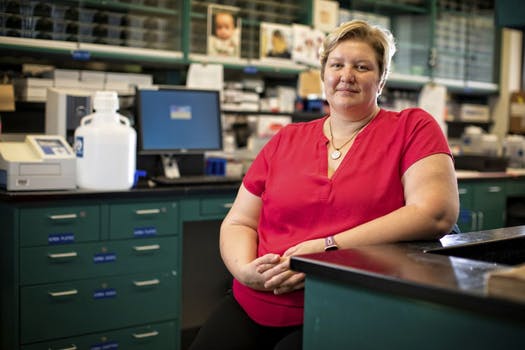| SCIENCE 561434222 Alzheimer's researchers rethink approach to the disease Scientists are exploring multiple ways of attacking a disease now considered too complex for a one-size-fits-all solution. By LAURAN NEERGAARD Associated Press SEPTEMBER 26, 2019 — 12:15PM MARK CORNELISON – ASSOCIATED PRESSAlzheimer’s specialist Donna Wilcock said, “There are a lot of changes that happen in the aging brain.” |
Contrary to popular perception, “there are a lot of changes that happen in the aging brain that lead to dementia,” said Donna Wilcock, an Alzheimer’s specialist.
For years researchers have been guided by one leading theory — that getting rid of a buildup of a sticky protein called amyloid would ease the mind-robbing disease. Yet drug after drug has failed. They might clear out the gunk, but they’re not stopping Alzheimer’s.
With more money — the government had a record $2.4 billion to spend on such research this year — scientists are rethinking Alzheimer’s and exploring multiple ways of attacking a disease now considered too complex for a one-size-fits-all solution.
‘Sort of a missing link’
No one knows what causes Alzheimer’s but amyloid deposits were an obvious first suspect, easy to spot in brain tissue. But it starts building up 20 years before any memory loss, and by itself is not enough to cause degeneration.
While it was known that amyloid buildup drives tau tangles, “we never had a good clue as to how it is doing that,” Holtzman said. The new findings “would argue that these cells are sort of a missing link.”
Is it germs? Is it inflammation?
The idea that infections earlier in life could set the stage for Alzheimer’s has simmered on the edge of mainstream medicine, but is getting new attention. Both the germ that causes gum disease and strains of herpes viruses have been found in Alzheimer’s-affected brain tissue.
Dr. Todd Golde of the University of Florida cautioned that the germs’ presence doesn’t mean they caused dementia — they could be a consequence of it.
A U.S. study found certain herpes viruses affected the behavior of Alzheimer’s-related genes. “Maybe these are just opportunistic pathogens that have space to spring up in the brains of people affected with Alzheimer’s disease,” said Benjamin Readhead of Arizona State University. But, “it looks at least plausible that some of these pathogens are capable of acting as accelerants of disease.”
One key commonality among emerging theories is how aggressively the brain’s immune system defends itself — and thus how inflamed it becomes. When inflammation is too strong, or doesn’t go away, it’s like friendly fire that harms cells. Remember how some people have lots of plaques and tangles but no dementia? Massachusetts General researchers found that strikingly little inflammation surrounded the gunky buildup in the resilient brains — but the Alzheimer’s-affected brains harbored a lot.
A handful of drugs are being explored to tamp down inflammation’s damaging side without quashing its good effects. The goal is to restore the balance of a healthy brain’s environment, Wilcock said, so microglia “can perform their essential functions without damaging surrounding tissue.”
“Now we have an opportunity, a real opportunity, to expand and try all these avenues,” said Alzheimer’s Association chief science officer Maria Carrillo.




 RSS Feed
RSS Feed